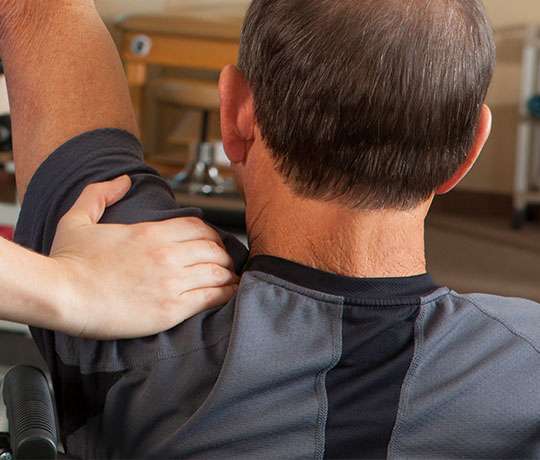What is emotional stress?
Stress is a normal reaction to the pressures of everyday life. Worry, fear, anger, sadness and other emotions are also all normal emotional responses. They are all part of life. However, if the stress that underlies these emotions interferes with your ability to do the things you want or need to do, this stress has become unhealthy.
What are the warning signs and symptoms of emotional stress?
Symptoms of emotional stress can be both physical, mental and behavioral.
Physical symptoms include:
- Heaviness in your chest, increased heart rate or chest pain.
- Shoulder, neck or back pain; general body aches and pains.
- Headaches.
- Grinding your teeth or clenching your jaw.
- Shortness of breath.
- Dizziness.
- Feeling tired, anxious, depressed.
- Losing or gaining weight; changes in your eating habits.
- Sleeping more or less than usual.
- Gastrointestinal problems including upset stomach, diarrhea or constipation.
- Sexual difficulties.
Mental or behavioral symptoms include:
- Being more emotional than usual.
- Feeling overwhelmed or on edge.
- Trouble keeping track of things or remembering.
- Trouble making decisions, solving problems, concentrating, getting your work done.
- Using alcohol or drugs to relieve your emotional stress.
How can I better cope with emotional stress?
There are many techniques that can be tried to help you better manage your emotional stress. Try one or more of the following:
Take some time to relax: Take some time to care for yourself. Even if you can devote only five to 15 minutes a few times a day to relax, take a break from reality. What activity helps you relax? Some ideas include:
- Read a book.
- Download and listen to a “calm” app (sounds of nature, rain) on your computer or phone.
- Take a walk. Practice yoga.
- Listen to music, sing along to a song or dance to music.
- Enjoy a soothing bath.
- Sit in silence with your eyes closed.
- Light a scented candle.
Practice mindfulness: Mindfulness is learning how to focus your attention and become more aware. You can learn to feel the physical changes in your body that happen in response to your changing emotions. Understanding this mind-body connection is the first step in learning how to better manage your stress and how emotions affect your body. Mindfulness can also help you focus your mind on the immediate – what can I do to bring my mind and body to a place of calmness. If you can figure out what helps you feel more calm and relaxed in that moment, you know you’ve figured out one of your stress triggers and what works to manage it.
Distract your mind and focus on something else: Focus your mind on something other than what’s causing your stress. Do something fun. Watch a funny movie, play a game, engage in a favorite hobby (paint, draw, take pictures of nature, play with your pet). Volunteer for an activity to help others. Do something with people you enjoy.
Try journaling: Journaling is the practice of writing down your thoughts and feelings so you can understand them more clearly. It is a method that encourages you to slow down, pay attention, and think about what is going on in your life – and your feelings and reactions to these happenings. Since journaling can reveal your innermost thoughts, it can reveal your emotional stress triggers. You can identify and then replace negative thoughts and feelings with behaviors that are more positive. Journaling is a healthy and positive way to face your emotions. When you confront your emotions, healing or change can begin.
Practice meditation: Meditation is another way to actively redirect your thoughts. By choosing what you think about, such as positive thoughts or warm, comforting memories, you can manage your emotions and reduce your emotional stress.
When should I get help for my emotional stress?
If you have any of the symptoms of emotional stress and have tried one or more of the remedies discussed in this article and haven’t found relief, seek professional help. If you feel overwhelmed and can’t manage your emotions and stresses on your own, seek the help of a professional. Don’t stay “frozen” or feeling like you’re holding your breath waiting for your feelings to be over. If you are stuck in a rut and can’t get yourself out, seek professional help.
Counselors and mental health therapists are trained professionals who can find ways to help you cope, reduce the effects of emotional stress, help you feel better and become more functional in your day-to-day activities.
If you or a loved one have thoughts of suicide, call the National Suicide Prevention Lifeline at 1-800-273-TALK (8255). They are available 24 hours/day, seven days a week.
What else can I do to help myself better manage emotional stress?
In terms of your general health, which affects your ability to manage and cope with stress, you need to take care of yourself the best that you can.
- Get quality sleep. Aim for seven to nine hours of sleep each night. Relax before bedtime with a soothing bath, some reading time or warm cup of chamomile tea. Learn other ways to sleep better.
- Maintain a healthy diet, such as the Mediterranean diet.
- Exercise regularly.
- Connect with others. Keep in touch with people who can help support you, both practically and emotionally. Ask for help from family, friends or religious or community groups you are associated with.
That’s why having a few strategies you’re familiar with can help you when you’re feeling anxious or angry. Consider adding these calming tactics to your toolbox.
But what happens when that anxiety or anger takes over, and you can’t calm down? Being able to calm yourself in the moment is often easier said than done.
We all worry and get upset from time to time. It’s a normal part of life.
Here are some helpful, actionable tips you can try the next time you need to calm down.
1. Breathe
“Breathing is the number one and most effective technique for reducing anger and anxiety quickly,” says Scott Dehorty, LCSW-C, of Delphi Behavioral Health.
When you’re anxious or angry, you tend to take quick, shallow breaths. Dehorty says this sends a message to your brain, causing a positive feedback loop reinforcing your fight-or-flight response. That’s why taking long, deep calming breaths disrupts that loop and helps you calm down.
There are various breathing techniques to help you calm down. One is three-part breathing. Three-part breathing requires you to take one deep breath in and then exhale fully while paying attention to your body.
Once you get comfortable with deep breathing, you can change the ratio of inhalation and exhalation to 1:2 (you slow down your exhalation so that it’s twice as long as your inhalation).
Practice these techniques while calm so you know how to do them when you’re anxious.
2. Admit that you’re anxious or angry
Allow yourself to say that you’re anxious or angry. When you label how you’re feeling and allow yourself to express it, the anxiety and anger you’re experiencing may decrease.
3. Challenge your thoughts
Part of being anxious or angry is having irrational thoughts that don’t necessarily make sense. These thoughts are often the “worse-case scenario.” You might find yourself caught in the “what if” cycle, which can cause you to sabotage a lot of things in your life.
When you experience one of these thoughts, stop and ask yourself the following questions:
- Is this likely to happen?
- Is this a rational thought?
- Has this ever happened to me before?
- What’s the worst that can happen? Can I handle
that?
After you go through the questions, it’s time to reframe your thinking. Instead of “I can’t walk across that bridge. What if there’s an earthquake, and it falls into the water?” tell yourself: “There are people that walk across that bridge every day, and it has never fallen into the water.”
4. Release the anxiety or anger
Dehorty recommends getting the emotional energy out with exercise. “Go for a walk or run. [Engaging] in some physical activity [releases] serotonin to help you calm down and feel better.”
However, you should avoid physical activity that includes the expression of anger, such as punching walls or screaming.
“This has been shown to increase feelings of anger, as it reinforces the emotions because you end up feeling good as the result of being angry,” Dehorty explains.
5. Visualize yourself calm
This tip requires you to practice the breathing techniques you’ve learned. After taking a few deep breaths, close your eyes and picture yourself calm. See your body relaxed, and imagine yourself working through a stressful or anxiety-causing situation by staying calm and focused.
By creating a mental picture of what it looks like to stay calm, you can refer back to that image when you’re anxious.
6. Think it through
Have a mantra to use in critical situations. Just make sure it’s one that you find helpful. Dehorty says it can be, “Will this matter to me this time next week?” or “How important is this?” or “Am I going to allow this person/situation to steal my peace?”
This allows the thinking to shift focus, and you can “reality test” the situation.
“When we’re anxious or angry, we become hyper-focused on the cause, and rational thoughts leave our mind. These mantras give us an opportunity to allow rational thought to come back and lead to a better outcome,” Dehorty explains.
7. Change your focus
Leave the situation, look in another direction, walk out of the room, or go outside.
Dehorty recommends this exercise so you have time for better decision making. “We don’t do our best thinking when anxious or angry; we engage in survival thinking. This is fine if our life is really in danger, but if it isn’t life threatening, we want our best thinking, not survival instincts,” he adds.
8. Have a centering object
When you’re anxious or angry, so much of your energy is being spent on irrational thoughts. When you’re calm, find a “centering object” such as a small stuffed animal, a polished rock you keep in your pocket, or a locket you wear around your neck.
Tell yourself that you’re going to touch this object when you’re experiencing anxiety or frustration. This centers you and helps calm your thoughts. For example, if you’re at work and your boss is making you anxious, gently rub the locket around your neck.
9. Relax your body
When you’re anxious or angry, it can feel like every muscle in your body is tense (and they probably are). Practicing progressive muscle relaxation can help you calm down and center yourself.
To do this, lie down on the floor with your arms out by your side. Make sure your feet aren’t crossed and your hands aren’t in fists. Start at your toes and tell yourself to release them. Slowly move up your body, telling yourself to release each part of your body until you get to your head.
10. Drop your shoulders
If your body is tense, there’s a good chance your posture will suffer. Sit up tall, take a deep breath, and drop your shoulders. To do this, you can focus on bringing your shoulder blades together and then down. This pulls your shoulders down. Take a few deep breaths.
You can do this several times a day.
11. Identify pressure points to calm anger and anxiety
Going for a massage or getting acupuncture is a wonderful way to manage anxiety and anger. But it’s not always easy to find time in your day to make it happen. The good news is, you can do acupressure on yourself for instant anxiety relief.
This method involves putting pressure with your fingers or your hand at certain points of the body. The pressure releases the tension and relaxes your body.
One area to start with is the point where the inside of your wrist forms a crease with your hand. Press your thumb on this area for two minutes. This can help relieve tension.



